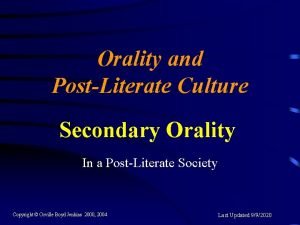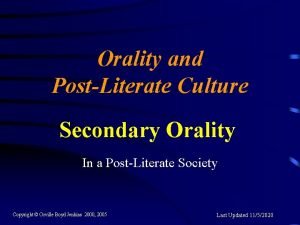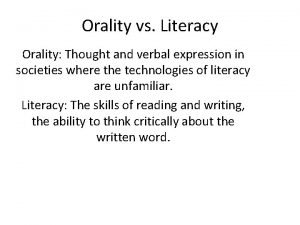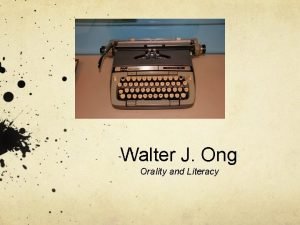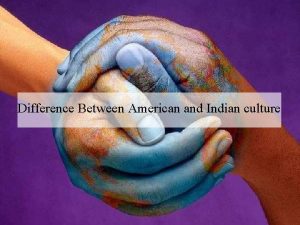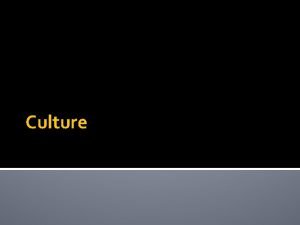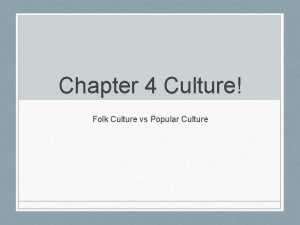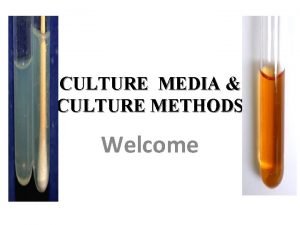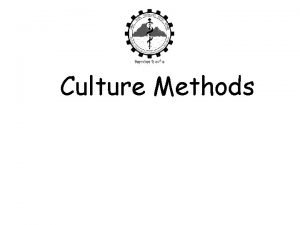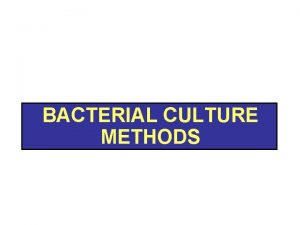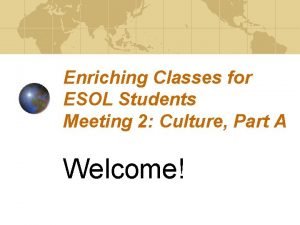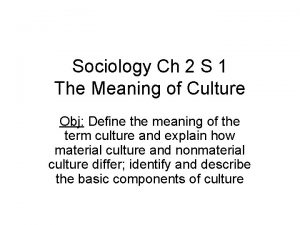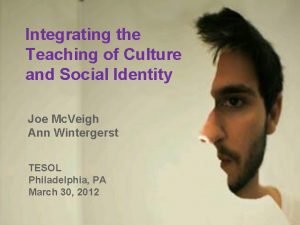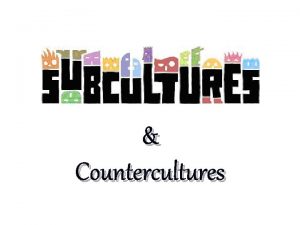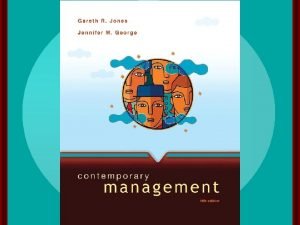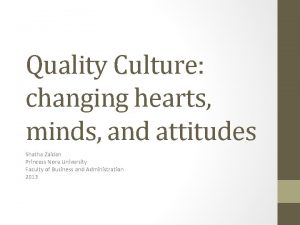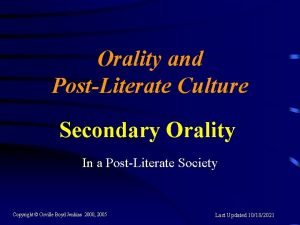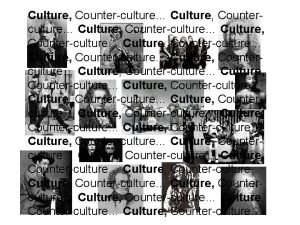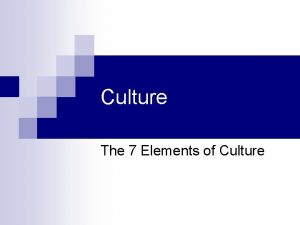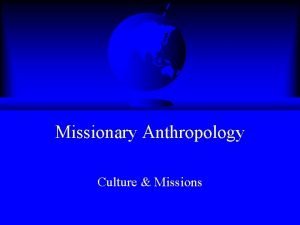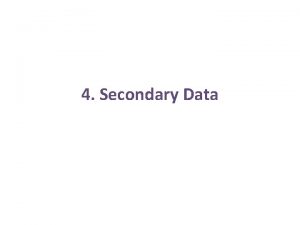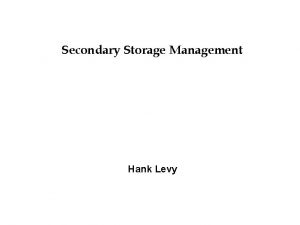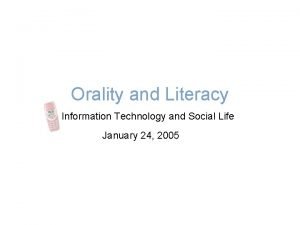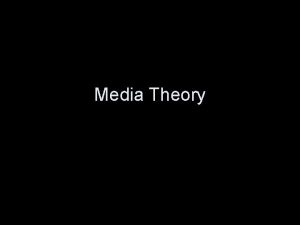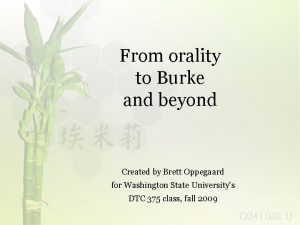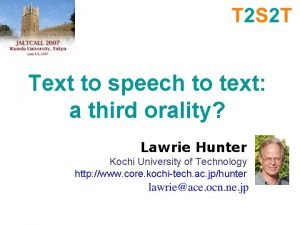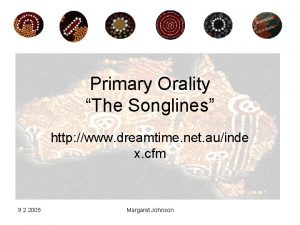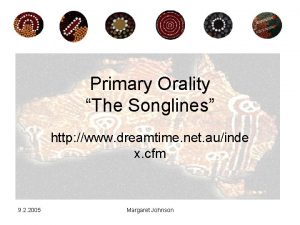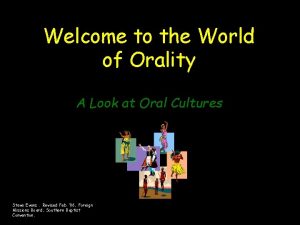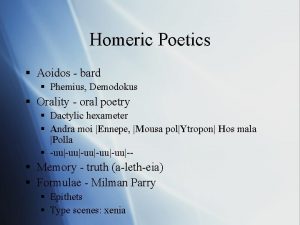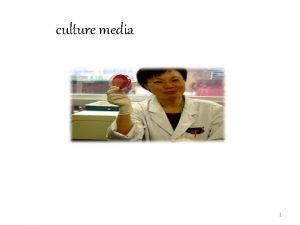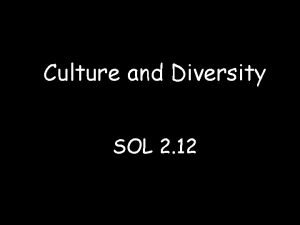Orality and PostLiterate Culture Secondary Orality In a























- Slides: 23

Orality and Post-Literate Culture Secondary Orality In a Post-Literate Society Copyright © Orville Boyd Jenkins 2000, 2004 Last Updated 9/9/2020

• Orality and Post-Literate Culture A new generation is riding the crest of a new wave. Communication formats have changed. Following the media revolution of the 60’s, the world has changed into a new era that has been termed: Post-Literate.

• Orality and Post-Literate Culture Post-Literate The West is well into the post-literate information age. Many emerging countries are likewise rapidly entering the post-literate age.

• Orality and Post-Literate Culture Post-Literate In the post-literate world, learners have a base of literacy, but their primary means of learning have shifted back to oral and aural media.

• Orality and Post-Literate Culture This new generation learns and processes in terms of media such as q television (drama, news, music, interactive graphics or text), qradio (music, news, discussion), telephone (often in conjunction with TV or radio),

• Orality and Post-Literate Culture This new generation learns and processes in terms of media such as qcomputer (which involves basic literacy, but more visuals, graphics and click skills), qetc.

• Orality and Post-Literate Culture In post-literate society, writing and reading are still of value, but only as they facilitate manipulation of other media.

• Orality and Post-Literate Culture There are differences in thought format between literate, “linear” thinkers and oral, or postliterate thinkers. The Western linear-type thinker has a high cultural value on Factual Knowledge.

• Orality and Post-Literate Culture The Western linear type thinker has a high cultural value on Factual Knowledge. This affects the priority in learning, planning, and the underlying sense of truth. Truth is seen as consisting in facts – Specific descriptive statements about an objective, perceivable reality.

• Orality and Post-Literate Culture Truth is seen as consisting in facts – Specific descriptive statements about an objective, perceivable reality. Knowledge is seen as the accumulation these facts. of

• Orality and Post-Literate Culture Oral culture, on the other hand, places priority on relationships, which produces a concept of dynamic truth and not a focus on facts. This dynamic relational concept of truth is called Functional Knowledge.

• Orality and Post-Literate Culture Oral culture q relationships q dynamic truth q not facts Functional Knowledge This focuses on relational skills. Truth is seen in terms of personal integrity and fulfilment of relational and family obligations.

• Orality and Post-Literate Culture The non-literate relational thinker -- with a focus on dynamic truth and functional knowledge – has a high facility of memory and an active skill of visual association. This is called Oral Literacy.

• Orality and Post-Literate Culture The post-literate uses visual skills to process images and activities more than writing skills. While the post-literate has an active attitude toward interactive visual media, formal skills in traditional literacy may be weak.

• Orality and Post-Literate Culture The post-literate may not have the high memory capacity of the traditional oral non-literate, due to the lack of emphasis on memory power in the broader dominant literate society.

• Orality and Post-Literate Culture Post-literate technology assumes traditional literacy skills, but the typical post-literate is a Passive Literate. The literacy skills needed for visual dramatic portrayal on TV or a music video, for example, are more for perception than learning or selfexpression.

• Orality and Post-Literate Culture Literacy is assumed and even necessary, but is not primary. It serves as an adjunct to the event-oriented dynamic visual world of interactive media.

• Orality and Post-Literate Culture The post-literate tends to favor an oralaural learning style, which complements this visual event-oriented literacy. The post-literate places a higher value on relationships and interaction than the traditional literate society, similar to oral cultures.

• Orality and Post-Literate Culture Personal experience is more important than objective fact and established knowledge. Thus in many ways the post-literate is more similar to the nonliterate than is the literate.

• Orality and Post-Literate Culture The learning and communication preferences of the post-literate are similar to those of the non-literate. They process information and make decisions in similar ways. Both are far removed from the way a literate person communicates, processes information, and makes decisions.

The gospel must be sown from within a culture. This presents the challenge of qhow to get inside the cultural worldview perspective and qhow to cast the glories of the Good News in attractive, understandable, meaningful, and acceptable terms.

• Orality and Post-Literate Culture A study of cultures and their communication formats is highly beneficial in knowing how to effectively communicate cross-culturally.

Orality and Post-Literate Culture Secondary Orality In a Post-Literate Society end Copyright © Orville Boyd Jenkins 2000, 2004 Last Updated 9/9/2020
 Secondary orality example
Secondary orality example Post literate society
Post literate society Orality examples
Orality examples Walter j ong orality and literacy
Walter j ong orality and literacy Time space compression ap human geography
Time space compression ap human geography Continuous culture and batch culture
Continuous culture and batch culture Difference between american and indian culture
Difference between american and indian culture Stab culture and stroke culture
Stab culture and stroke culture Folk culture and popular culture venn diagram
Folk culture and popular culture venn diagram What is folk culture
What is folk culture Composite media in microbiology
Composite media in microbiology Folk culture and popular culture venn diagram
Folk culture and popular culture venn diagram Lawn culture method
Lawn culture method Explain stab culture and stroke culture
Explain stab culture and stroke culture Surface culture deep culture and esol
Surface culture deep culture and esol Individual culture traits combine to form culture patterns.
Individual culture traits combine to form culture patterns. Batch culture vs continuous culture
Batch culture vs continuous culture Individualistic culture definition
Individualistic culture definition Sub culture group
Sub culture group Adaptive culture from inert culture
Adaptive culture from inert culture Quality culture
Quality culture Primary and secondary effects of a tectonic hazard
Primary and secondary effects of a tectonic hazard Impact of business decisions on stakeholders
Impact of business decisions on stakeholders Planting more trees is called
Planting more trees is called
